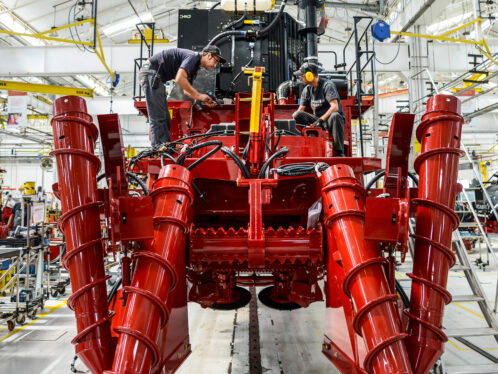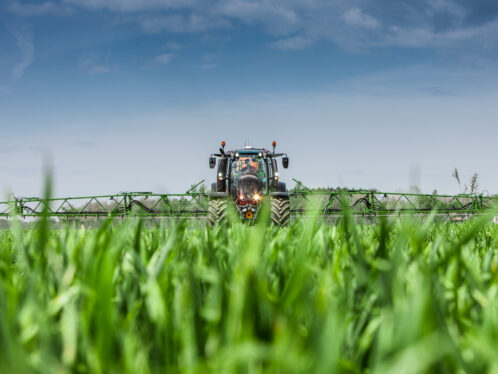
Flour power
Allied Mills grinds huge volumes of wheat into flour 24/7 the whole year round, providing bakeries, primarily in the UK, with a consistent, high-quality product. Keeping up with the non-stop demand means avoiding unplanned downtime.
In London’s Tilbury Docks, Duncan Lawson stands in front of an impossibly tall silo wearing a cap and a fluorescent yellow vest. As group engineering manager at Allied Mills, Lawson would once have been in charge of dozens of workers, but nowadays he supervises a mere 15 engineers across three plants. Among them, they maintain the plants, which grind almost a quarter of the UK’s annual flour production.
Lawson explains that the wheat is purchased months in advance by the company’s procurement team and is sourced from around the world. Once it arrives on site, the hard work begins.
Different wheat varieties not only have different protein contents, but also different rheological properties. “In order to make bread flour from wheat,” says Lawson, “it must have the appropriate protein content and characteristics for the end product.” The task of the manufacturing manager is to master the correct balance between the quality of the various blended grains and their various protein levels and the cost of the product. Getting this combination, or “grist”, exactly right takes a high degree of skill.
“We need different grists for different end products,” explains Lawson. “Our two main flour products are white bread flour and wholemeal. We also use durum wheat to make semolina for high-quality pasta.” Each variety is stored in a separate silo, but all the wheat will eventually undergo similar processing.
“During the intake and first clean,” says Lawson, “the wheat is coarsely cleaned. It arrives straight from the harvest or store, complete with straw, chaff and, occasionally even, five-pound notes.” The second clean is much finer, and its exact specifications depend on the size, shape and density of each grain. Water is also now added. The wheat must absorb this moisture and be left to condition in one of the giant silos for 12 to 24 hours. Without water, the untempered wheat cannot be milled, as the grains will merely crack and split when ground.
The final element of the process is the milling itself. The flutes, teeth and smooth surfaces of the rollers in the mills pound and pummel the wheat, and sifters mechanically sift it into flour. The precise nature of the finished product depends on the configuration of each roller mill and sifter setting.
“The whole process is touchy-feely,” says Lawson, “with the head miller [now called the manufacturing manager] playing the crucial role. He has to measure the moisture and the protein content electronically and adjust them minutely to suit the dictates of the commissioned finished product. He must also make sure that his online systems are up to the job of monitoring the entire process.”
The resulting base flour is then blended according to each customer’s specifications and loaded into bulk tankers. The lion’s share goes to Allied Bakeries, which like Allied Mills is owned by Associated British Foods. Allied Bakeries produces its own loaves under such brand names as Kingsmill. “We also supplyturnkey bespoke flour into the private trade, i.e., companies outside the Associated British Foods group,” says Lawson.
Says Philip Beach, Allied Mills general manager: “Despite the fact that people like to claim that they prefer crusty brown [bread], the vast majority of the bread products bought in the UK are still sliced, white wrapped loaves. Wholemeal flour remains a niche market. In order to meet some specialist needs, we need to buy in other varieties [French wheat for baguettes, for example], but ultimately we aim to beat other companies on quality, service and consistency.”
The effect of this is that, while sales of white bread flour have decreased marginally over the past decade from 53 percent of total market share to around 48 percent, the wholemeal share has remained constant at around 6 percent. Allied Mills also produces a significant proportion of the UK’s semolina flour. By-products from the milling process are also made up into pellets to be sold to producers for animal feed.
“Ultimately though,” says Beach, “our aim is to provide bakeries with a consistent quality of raw material as the major ingredient in the baking process. On this site, we mill flour in high volumes 24/7, 365 days a year, and we want to keep that process up and running as smoothly as possible.”
SKF’s contribution
“In 2005, Allied Mills approached us to help with asset liability,” says Paul Deighton of SKF. “Their main concern was reliability, and they were aiming for a situation where production never had to stop unless the market allowed it. We used a technique, based on a total review of the group’s existing strategy, called ‘client needs analysis’ [CNA] to enable Allied Mills to develop an evolving asset care strategy.”
SKF followed this up in 2009 with another CNA to measure the improvement and encouraged the introduction of a root cause failure analysis each time the mill had to stop unexpectedly for more than four hours. A team was established to determine why each stoppage occurred, whether it was predictable and how fast the mill could recover.
In addition, SKF encouraged Allied Mills engineers to sit down as a team to discuss maintenance for its 5,000 assets and to view this process as an integral, value-added part of the business. It’s part of SKF’s focus on “criticality” – identifying and predicting possible breakdowns and planning preventive maintenance. “Now,” says Duncan Lawson, Allied Mills’ group engineering manager, “the aim is to maintain at our leisure.”









